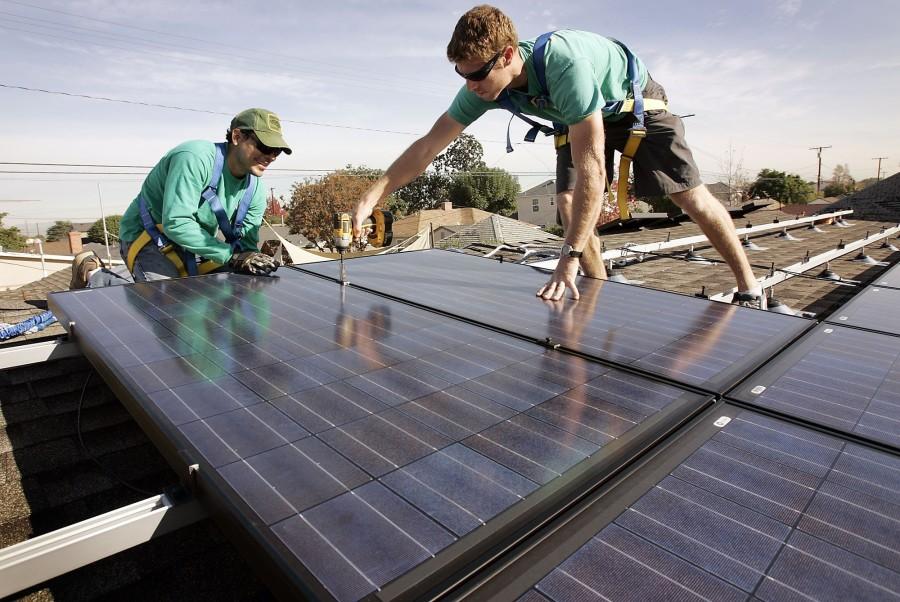Could Solar Solve the Energy Equation?
Costs have decreased and incentives have increased
Joey Ramirez, left, and Taran Stone with SolarCity install solar modules on the roof of a Long Beach, Calif., home. Florida “has a ton of sunshine, a ton of rooftops,” a SolarCity spokesman said. “But there is no rooftop solar industry in Florida.” (Al Seib/Los Angeles Times/MCT)
As the world evolves and new technologies are introduced, one resource has been crucial to human progress: energy. As the need for cheaper energy grows steadily, and as taxes on energy begin to take their toll on the general population, one solution that has the potential to solve this crisis may be solar energy. The SEIA (Solar Energy Industries Association) states that Massachusetts has installed over 194 megawatts of solar power, enough to power 30,000 homes, and a goal has been set to reach 250 megawatts of solar power by 2017. Solar power introduces the prospect of cheap, plentiful energy at no cost to the environment.
Availability
Over time, solar power costs have decreased dramatically due to new energy research, as well as new state policies that make the use and installation of solar collectors inexpensive. Recent federal tax incentives grant a 10-30 percent tax credit for qualified homeowners interested in solar panel installation, according to the Massachusetts Department of Revenue, which also states that residents can receive additional tax credits that can reduce another 15 percent of the total cost of solar panel installation. In total, a qualified resident of Massachusetts can save 45 percent off of their solar panel installation via government funding. Considering most residential solar projects cost somewhere between $15,000 and $40,000, as stated by energyinformative.org, this would reduce the cost to as low as $8,250. Doing this, one could expect to reap the benefits of the investment within the next decade. In addition, the homeowner would continue to save over $20,000 over the course of the next 25 years. Businesses can save even more, as government programs provide even more tax credit for businesses that incorporate solar energy in their operations. Solar energy is a legitimate safe investment for homeowners, businesses, and corporations who are interested in reduced energy costs.
Efficiency
One of the major complaints about solar energy is that it is inefficient, and is incapable of fueling modern society. However, recent solar breakthroughs argue against this. The U.S. has recently finished what the Department of Energy states is the world’s largest concentrating solar power plant, capable of generating 392 megawatts—enough to power almost 100 thousand homes. There are about 3 million housing units in Massachusetts, and 30 solar power plants would be enough to power every home in Massachusetts. In fact, Massachusetts is currently a U.S. leader in solar energy, ranking fourth in total solar energy output.
The Environment
Another reason so many residents are suddenly changing to solar is because of the environment. According to the organization S.A.G.E., installing one solar panel system is like planting 100 trees every year. Doing this has a huge impact on the environment, as well as the climate. As humanity creates more and more pollution, more and more areas of the world are experiencing the backlash of the problem. Over the past several years, increasingly severe storms have occurred all over the world, leading many to believe pollution is the cause.
The idea of fueling the world using solar energy is difficult to imagine, but solar has already shown it’s vast capabilities for energy production. The independent organization Environment Massachusetts estimate that Massachusetts could get 20 percent of its energy from solar by 2025. If this is the case, it would be a major step in decreasing the world’s dependence on fossil fuels. And solar is very quick to install, taking anywhere from a couple of hours to three days according to Pure Energies Group, Inc. Because of its accessibility and quick installation, the population could quickly solve a major crisis, if they are only willing to take a step in the right direction.


